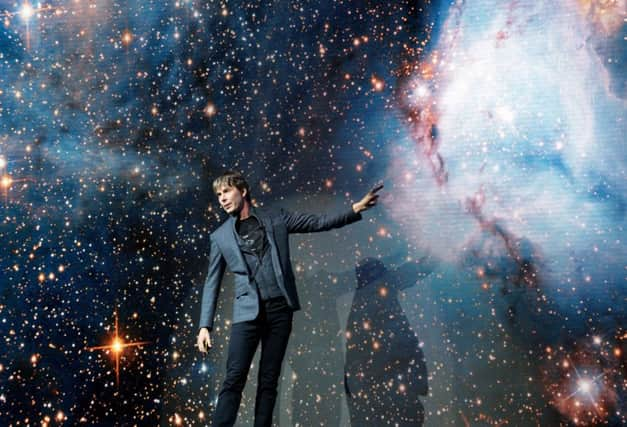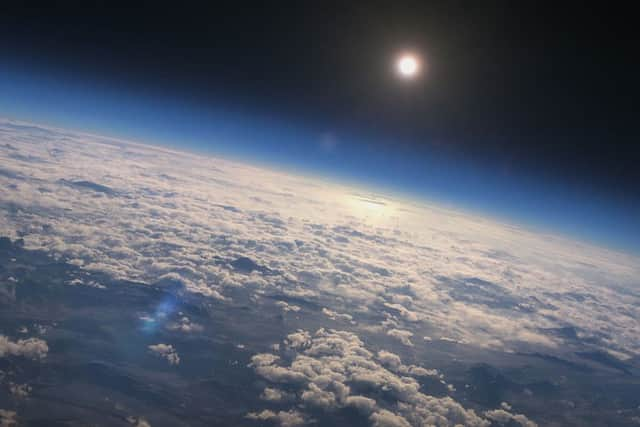Brian Cox’s new show The Planets offers universal lessons


If you watch a show presented by Professor Brian Cox, you can guarantee by the end of it you will feel that bit more intelligent.
His latest project, BBC Two’s The Planets, which is co-produced by the Open University, uses data from the very latest space explorations to tell the extraordinary life story of our solar system, while mind-blowing CGI brings the planets to life.
Advertisement
Hide AdAdvertisement
Hide AdIt follows a number of other landmark BBC documentaries fronted by Prof Cox, who has completed decades of work as a physicist at the University of Manchester, as well as bringing us Wonders of the Solar System, Human Universe and Forces of Nature with Brian Cox – and a spell in the band D:Ream.


Asked how he finds interacting with the fans he has amassed through his TV work, the Oldham-born academic, 51, suggests: “Science is one of the ways that we understand what it means to be human.
“I would say to get a complete picture of the things that we all care about, science and the arts and literature and music are all part of an attempt to understand why we’re here and what it means.
“So I’m delighted that people, not just myself but Alice Roberts and Helen Czerski and Jim Al-Khalili, are now big public figures.
Advertisement
Hide AdAdvertisement
Hide Ad“And it should be said it’s because of a decision that was taken some time ago at the BBC, which is still the policy now, to have academics present television programmes.
“That’s ultimately what we are and that I think it’s extremely important. We need more public intellectuals in every field, we really do.”
The show will be on television from next Tuesday, ahead of Cox continuing his world tour called Universal: Adventures In Space & Time. After a series of sold-out dates in the UK earlier this year, the show is currently travelling across America before heading to Hong Kong, Singapore, New and Australia next month. It will be back in this country in September, with arena dates in Leeds and Hull scheduled.
Ahead of his live show coming back to Yorkshire later this year, Cox says television viewers can expect an intellectually bolder series in the eight-episode run of The Planets in comparison to past programmes.
Advertisement
Hide AdAdvertisement
Hide Ad“Particularly things like the grand tack model, they’ve only been around a couple of years and it’s unusual to put those cutting-edge theories into landmark television, you tend to be rather more conservative,” he explains.
“The other difference is there’s an underlying philosophy to the series. I like the Jupiter film, in particular, for this reason.
“The philosophy is that the solar system is a system but I think that’s quite surprising, and an important point actually, because it is quite natural for us, I think, to focus our eyes on the Earth alone and think that we’re isolated from the goings on in the rest of the Universe.”
Cox says his job has been helped in this series by the ever-increasing number of observations of other solar systems by scientists.
Advertisement
Hide AdAdvertisement
Hide Ad“It’s critically important in our understanding of the solar system today that we’ve now seen well over 3,000 planets around distant stars.
“And what we’ve seen is the geography of solar system, the layout of solar systems, are not like ours in general.”
One of the ways the show will try and get across its ideas and scientific explanations to viewers is by personifying the planets – with Jupiter being The Godfather, for example.
“When you start a series like this, there are different writing ideas and one of them was to characterise the planets in that way. And I think it’s survived to some extent,” he says.
Advertisement
Hide AdAdvertisement
Hide Ad“I have conflicting emotions about that – intellectually, I’m conflicted about that. But in this case, it works because it (Jupiter) is a presence in the solar system. It’s much more massive than any of the planets put together, so its influence is real, and has been real.”
Cox says in his opinion, Saturn is the most beautiful planet in our solar system.
“I’m always looking for the philosophical underpinnings of the films – it doesn’t necessarily become explicit but it’s there. And Saturn, it’s obviously characterised as being the most beautiful of the planets – it’s a beautiful, stunning thing, with its rings.
“What I found interesting is that it’s very likely those rings are very temporary. Beauty is so temporary. It’s very likely dinosaurs – if they’d had telescopes – would not have seen the rings, they wouldn’t have been there.
Advertisement
Hide AdAdvertisement
Hide Ad“So, they’re probably tens of millions of years old and they will be gone in not too long.”
The professor says there are probably still planets out there that humanity does not yet know about.
“We didn’t look at that in this series but there does seem to be circumstantial evidence there’s certainly other small things out there – Pluto-sized objects, lots of them.
“But in terms of a big planet – yes, there is some circumstantial evidence there might be. The distances are so vast and the sunlight is so dim out there, there could be big things and we wouldn’t have seen them.”
Advertisement
Hide AdAdvertisement
Hide AdHe says Neptune and Uranus proved to be the trickiest planets to talk about.
“Because we’ve been there once, with Voyager, for about an hour at a time – a very old spacecraft, it was designed in 1960s. Uranus and Neptune are difficult planets to characterise because we don’t know a lot about them.
“And even the moons... we know that Neptune’s moon, Triton, seems to be active and we talk about that in the last film. It seems to have these eruptions from the surface – a complete surprise. The thing about Uranus is it’s tipped over completely, it’s rotated through 90 degrees.
“These models we’ve got, they’re not able to explain the specifics such as why Uranus is tipped up. Maybe we will never know what happened. It obviously collided with something but we don’t know what.”
Advertisement
Hide AdAdvertisement
Hide AdHe says contrasting Earth with the relatively similar Mars and Venus shows how fortunate we are to have life on our planet. “They’re all in what’s called a habitable zone around a star so if an alien astronomer saw our solar system, they would label those as potentially habitable planets.
“Yet Venus is undoubtedly not habitable now because of this trajectory it went on. So, it shows you one possible future for a planet like Earth. Similarly, with Mars, early on its history it certainly had oceans but it lost them.
“And so, I do think you tend to start to build a picture of what a really rather fortunate planet Earth is. And that’s important.
“Because we want to know what the probability of finding life on other worlds is.”
Live tour heading to Yorkshire
Advertisement
Hide AdAdvertisement
Hide AdProfessor’s Cox live tour will see him accompanied by comedian Robin Ince, with whom he hosts the popular BBC Radio 4 show The Infinite Monkey Cage.
Cox will perform at Leeds First Direct Arena on September 11 and Hull Bonus Arena on September 12.
A spokesman said: “This entertaining show will take audiences to the edge of our current understanding about the origin and evolution of our solar system and the universe.”
The Planets will start on BBC Two on Tuesday May 28. The Planets by Prof Brian Cox and Andrew Cohen is published by William Collins, £25.
For more information about and to book tickets for his live tour, visit www.briancoxlive.co.uk.